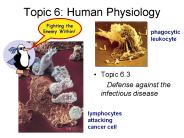Thymus Dependent Lymphocyte PowerPoint PPT Presentations
All Time
Recommended
(1) Antigen-specific TCR dimers: ab (90-95% of all T cells) or gd; ... gd T cells recognize a limited set of unusual antigens: ...
| PowerPoint PPT presentation | free to view
Title: 15. T-lymphocytes, ontogenesis, surface markers. Subpopulations of T-lymphocytes and their functions. Author: hal Last modified by: hal Created Date
| PowerPoint PPT presentation | free to download
... Antigen Antagonistic peptid Antibodies Cytokines and intercellular contact T lymphocytes Neuroendocrine regulation REGULATION BY ANTIGEN Antigen competition ...
| PowerPoint PPT presentation | free to download
Lymphocytes Play major role in immunity GENESIS 1.Lymphoblast:15-20 micrometer Large nucleus with rarely more than 2 distinct nucleoli Cytoplasm is blue as a narrow ...
| PowerPoint PPT presentation | free to view
Mitogen receptor ... ---Related to lymphocyte transformation test PHA( ... Na ve T cell Effective T cell Memory T cell stimulation of Ag no ...
| PowerPoint PPT presentation | free to view
Development of B lymphocytes Parham, Chapter 4 B cell development Pre-B cell pre-B cell receptor = m + surrogate light chain B cell development in bone marrow Ig gene ...
| PowerPoint PPT presentation | free to view
... cells diseases Leukemia Malignant disease with origin in bone marrow Chronic lymphocytic leukemia ... (LYMPHOCYTIC) LEUKEMIA (ALL) ACUTE LYMPHOBLASTIC ...
| PowerPoint PPT presentation | free to download
pro-B cell:??heavy-chain genes(DH/ JH joining),?????????? ... To provide stimulatory modifying signals. Complex of CD19, CR2 (CD21) and TAPA-1 (CD18) ...
| PowerPoint PPT presentation | free to view
The Chronic Lymphocytic Leukemia (CLL) Prognostic factor Good prognosis Bad prognosis Serum markers: lactate dehydrogenase activity (LDH) 2-mikroglobulin activity ...
| PowerPoint PPT presentation | free to view
Title: PowerPoint Presentation Subject: The Immune System Author: Parham Last modified by: student Created Date: 12/16/2002 8:36:41 PM Document presentation format
| PowerPoint PPT presentation | free to view
The Development of Lymphocytes Generation of T cell clones: clonality Origin, generation and differentiation of T cells T cell progenitors migrate from bone marrow ...
| PowerPoint PPT presentation | free to view
... close-packed consists of ectodermal cells; can contain thymocytes and ... anlage : The combination of the ectodermal and endodermal cells, colonized by ...
| PowerPoint PPT presentation | free to view
The Development and Survival of Lymphocytes
| PowerPoint PPT presentation | free to view
virus-infected cells are recognized by t-lymphocytes in mhc-dependent manner tissue transplantation is restricted by mhc molecules the immune response to protein ...
| PowerPoint PPT presentation | free to view
DOES NOT DISCRIMINATE BETWEEN SELF-REACTIVITY AND REACTIVITY TO FOREIGN ... Lutz and Schuler, Trends Immunol: 23:9. Immunity vs Tolerance in Peripheral B Cells ...
| PowerPoint PPT presentation | free to view
Mechanism of Ig Isotype Switching. CD4 T Cell-Dependent Effects in. Antibody Responses ... Isotype Switching. Affinity Maturation. Thymus-Independent Antigens ...
| PowerPoint PPT presentation | free to view
Lymphoma is a type of cancer that begins in the infection-fighting lymphocytes of the immune system. Lymphoma cancer cells can grow in any part of the lymphatic system, including the spleen, the bone marrow, thymus, lymph nodes, or any other part of the body. visit our website for more information on Lymphoma cancer : https://doctorpkdas.com/
| PowerPoint PPT presentation | free to download
expression of concomitant immunity is dependent on intact thymus during primary infection ... for induction of protective immunity in laboratory hosts and its ...
| PowerPoint PPT presentation | free to view
Pre-B cells do express RAG1/RAG2 in the nucleus. ... signals the cells to down regulate RAG1/RAG/2 and to cease further rearrangements. ...
| PowerPoint PPT presentation | free to view
IgG and IgM based immunopathological reaction (reaction of hypersensitivity type II). = antibody-dependent antibodies produced by the immune response bind to antigens ...
| PowerPoint PPT presentation | free to view
Humoral antibodies in the bloodstream. Cell mediated lymphocytes that ... humoral immunity. T Lymphocytes various types that ... humoral and cell ...
| PowerPoint PPT presentation | free to view
Selenium is a boost to thymus activity, ... promote enzyme activity, and produce antimicrobial ... ginger, lemon & honey tea Botanical Medicine Andrographis ...
| PowerPoint PPT presentation | free to view
Distribution of toxicants in the body Lymphatic system Lymph capillaries, nodes, tonsils, spleen, thymus, ... Heavy metals, like Pb Storage in liver.
| PowerPoint PPT presentation | free to download
Monoclonal antibodies Anticancer therapy * * * * * * * * * Lymphocytes Produce antibodies B-cells mature in bone marrow then concentrate in lymph nodes and spleen T ...
| PowerPoint PPT presentation | free to view
Chapter 43 Warm-Up Define the following terms: Pathogen Antigen Antibody Allergen Vaccine What are lymphocytes? Where do B cells and T cells mature?
| PowerPoint PPT presentation | free to download
Key: = Site of lymphocyte origin = Site of development of immunocompetence as B or T cells; ...
| PowerPoint PPT presentation | free to download
Immune Response FUNCTIONS Defense ... Mediated B-Lymphocytes react to extracellular antigens Sensitization occurs Division into Plasma and Memory Cell Antibody ...
| PowerPoint PPT presentation | free to view
HAEMATOPOIESIS DR. AYESHA JUNAID MBBS,MCPS,FCPS. Professor of Pathology Consultant Haematology Incharge Blood Transfusion Services SIH LYMPHOPOIESIS T.LYMPHOCYTES ...
| PowerPoint PPT presentation | free to view
Gamma ray-mediated formation of DNA damage in isolated calf thymus DNA in ... Yields of formation of 11 base modifications in the DNA of monocytes upon ...
| PowerPoint PPT presentation | free to download
Specific Defenses The Immune System Definitions Innate (nonspecific) Defenses against any pathogen Immunity Specific antibody and lymphocyte response to an antigen ...
| PowerPoint PPT presentation | free to download
T Cell Receptor & T Cell Development ... confers high affinity binding to IL-2Rbg Key TR growth factor CTLA-4 cytotoxic T lymphocyte Ag-4 Binds to B7s (CD80/86) ...
| PowerPoint PPT presentation | free to download
A cancer of the lymphatic system, specifically of lymphocytes. ... Lymphomas fall into two categories: Hodgkin lymphoma ... Zenaida Abanto. Limitations ...
| PowerPoint PPT presentation | free to view
... major categories of response: humoral immunity and cellular immunity. Adaptive ... Cellular and humoral immunity: various lymphocytes are stimulated including ...
| PowerPoint PPT presentation | free to download
... activation results from alterations in gene products that govern new functions. ... Magnitude determined by balance between the extent of lymphocyte activation and ...
| PowerPoint PPT presentation | free to view
Immunology Components Primary lymphoid organs: bone marrow & thymus Secondary lymphoid organs: lymph nodes, spleen, Peyer s patches, & MALT Cells of the Immune ...
| PowerPoint PPT presentation | free to view
Poison Ivy. Contact dermatitis. Metals. Cosmetics ... Poison ivy pg. 512. T-Suppressor: sensitized T lymphocytes. A subset of T helper and T cytotoxic ...
| PowerPoint PPT presentation | free to view
IgG and IgM based immunopathological reaction (reaction of hypersensitivity type II). = antibody-dependent antibodies produced by the immune response bind to antigens ...
| PowerPoint PPT presentation | free to view
... stem cell diseases that result in expansion and excessive production ... node, bowel, breast, lungs, mediastinum, mesentery, skin, synovium, thymus and ...
| PowerPoint PPT presentation | free to view
Production of T (Killer cell mediated response) and B lymphocytes (humoral/antibody response) ... Latent period or lag phase. B cell differentiation is occurring ...
| PowerPoint PPT presentation | free to view
Lymphocytes are wholly responsible for the specific immune ... Flat bilobed organ in the chest cavity. Increases in size until puberty and then atrophies. ...
| PowerPoint PPT presentation | free to view
13 Immunity in the Fetus and Newborn 13-1 Development of the Immune System The thymus is the first immune organ to develop. The development of secondary immune organs.
| PowerPoint PPT presentation | free to view
T cells, during their development in the thymus, are subject to two round of selection. ... The second round is Negative Selection where T cells that recognize self ...
| PowerPoint PPT presentation | free to view
LYMPHATIC SYSTEM MACROPHAGE ATTACKING E. COLI HUMAN T-LYMPHOCYTE LYMPHATIC VESSELS LYMPHATIC VESSELS LYMPH CAPILLARIES- microscopic, blind-ended; spider-web between ...
| PowerPoint PPT presentation | free to view
An adaptive immune response mediated by specific cells of the immune system Primarily T lymphocytes (T cells), but also macrophages and NK cells.
| PowerPoint PPT presentation | free to view
Molecular basis of lymphocyte differentiation: transcription factors Soluble factors and cognate interactions involved in the differentiation of lymphoid cells
| PowerPoint PPT presentation | free to view
... each clone only bears a unique type of Ag receptor The clones of lymphocyte that can recognize self-Ags will be destroyed or learn to tolerance to self Ags ...
| PowerPoint PPT presentation | free to view
Several day lag, then antibody becomes detectable. Antibody is IgM class ... Over a million different B lymphocytes are produced in each individual ...
| PowerPoint PPT presentation | free to view
B lymphocytes ... B cells mature in the bone marrow and provide Ab-mediated immunity ... Lag period: 3 to 6 days after antigen challenge ...
| PowerPoint PPT presentation | free to view
Topic 6: Human Physiology Fighting the Enemy Within! phagocytic leukocyte Topic 6.3 Defense against the infectious disease lymphocytes attacking cancer cell
| PowerPoint PPT presentation | free to download
All of the following except ____ is a function of the lymphatic system. Production, maintenance, and distribution of lymphocytes Resisting and overcoming disease
| PowerPoint PPT presentation | free to download
... immunity-natural transfer of antibodies from mom to child (breast feeding and in ... T cells mature in the thymus gland ... Mature B cells are found in ...
| PowerPoint PPT presentation | free to view
Fetus- liver, thymus gland, spleen, lymph nodes, red bone marrow ... Bendable- easy to get through small capillaries. No nuclei- lost during development ...
| PowerPoint PPT presentation | free to view
Autoimmunity n. of, relating to, or caused by autoantibodies or lymphocytes that attack molecules, cells, or tissues of the organism producing them.
| PowerPoint PPT presentation | free to download
Non-Hodgkin lymphoma (also known as non-Hodgkin's lymphoma, NHL, or sometimes just lymphoma) is a cancer that starts in cells called lymphocytes, which are part of the body's immune system. Symptoms depend on what area of the body is affected by the cancer and how fast the cancer is growing.
| PowerPoint PPT presentation | free to download
Immune Response Hugh B. Fackrell Filename:tissuesv7 Structure and Function of the Lymphatic System Lymphatic system Primary Lymphoid tissues Secondary Lymphoid ...
| PowerPoint PPT presentation | free to download
The Wiskott-Aldrich Syndrome: An X-linked Primary Immunodeficiency Kristin Goff WAS Primary immune deficiency disorder Entails part of the bodies immune system is ...
| PowerPoint PPT presentation | free to download
























































